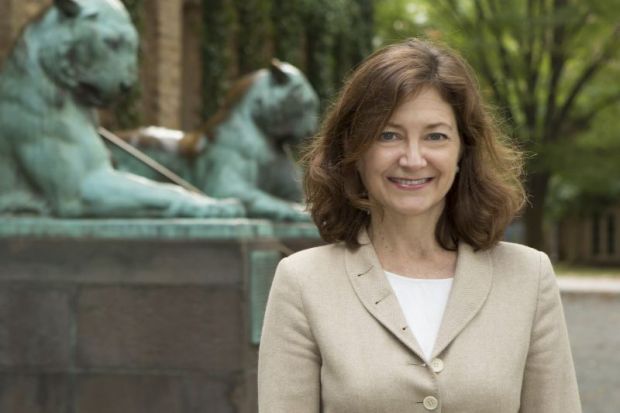The University of Cambridge has nominated Deborah Prentice, the provost of Princeton University, as its next vice-chancellor.
Professor Prentice, a psychologist who has spent all her 34-year academic career at the New Jersey institution, is set to become the first American to lead Cambridge.
Subject to approval by Regent House, the body comprising academic and senior administrative staff of Cambridge and its colleges, she will succeed Stephen Toope in July 2023.
Professor Prentice, who as provost since 2017 has been responsible for all academic, budgetary and planning issues at Princeton, was one of three candidates interviewed by Cambridge’s university council.
Pippa Rogerson, master of Gonville and Caius College, Cambridge, who chaired the advisory committee on the recruitment process, said the panel had been “privileged to be able to meet and consider an exceptionally strong field of applicants from around the world”.
“Professor Prentice was an outstanding candidate from the start and we had no hesitation in putting her forward for consideration by the university council,” Professor Rogerson said.
Professor Prentice, who is set to be appointed to serve a seven-year term, said that it was “a huge honour to be nominated to lead such a renowned institution”.
“Higher education around the world faces many challenges, but I firmly believe there are also great opportunities to demonstrate how our leading universities can together harness their expertise to solve global problems. I hope that I can play some part in leading that dialogue,” she said.
Having completed a PhD at Yale University, Professor Prentice joined Princeton as lecturer in psychology in 1988 and developed a specialism in the study of domestic violence, alcohol abuse and gender stereotypes. She chaired the department of psychology for 12 years before being appointed dean of faculty in 2014.
With her appointment, Cambridge is taking a different approach to its long-time rival, the University of Oxford, which looked close to home to find its incoming vice-chancellor, Irene Tracey, warden of Merton College, Oxford, since 2019. She will succeed Dame Louise Richardson next year.
But it is a hunting ground in which Cambridge has operated before, having appointed Dame Alison Richard, Yale’s provost and a British anthropologist, as vice-chancellor in 2004.
Professor Toope, a Canadian, was vice-chancellor of the University of British Columbia and director of the University of Toronto’s Munk School of Global Affairs before joining Cambridge.
He is stepping down after five years at the end of this month, having cited the challenge of being separated from his family in Canada during the Covid-19 pandemic as the reason for his departure.
In the interim, Cambridge will be led by Anthony Freeling, currently president of Hughes Hall, Cambridge.
Mark Lewisohn, deputy chair of Cambridge’s council, said of the appointment of Professor Prentice: “In making its nomination, council is confident that the university will be gaining a highly experienced and formidably talented academic and leader who will be able to guide Cambridge through the many opportunities and challenges that lie ahead.”
Register to continue
Why register?
- Registration is free and only takes a moment
- Once registered, you can read 3 articles a month
- Sign up for our newsletter
Subscribe
Or subscribe for unlimited access to:
- Unlimited access to news, views, insights & reviews
- Digital editions
- Digital access to THE’s university and college rankings analysis
Already registered or a current subscriber? Login








